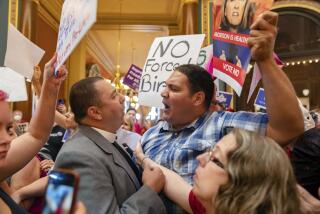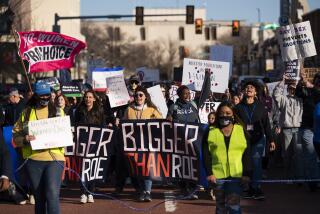Quick Ruling on Roe vs. Wade Sought : High court: Advocates for abortion rights call for decision on constitutional protection. Legal move could create a fiery issue for 1992 election.
- Share via
WASHINGTON — In a bold gamble geared more to politics than the legal process, abortion rights attorneys asked the Supreme Court Thursday to rule quickly and decisively on whether the Roe vs. Wade ruling that established a right to abortion remains the law.
Rather than seek to delay or file a narrowly worded appeal in a pending Pennsylvania case, lawyers for the American Civil Liberties Union and the Planned Parenthood Federation announced they had filed an appeal that ignores the specifics of state law and asks the high court to rule squarely on whether “a woman’s right to choose abortion is a fundamental right protected by the U.S. Constitution.”
The legal move increases the chance that the Republican-dominated Supreme Court could overturn Roe vs. Wade by next summer, a decision that could make abortion a fiery issue during the 1992 presidential election.
The ACLU lawyers conceded that theirs was a “risky” strategy. The 1989 Pennsylvania law under consideration requires women to delay 24 hours and to notify their spouses before getting an abortion. Despite these regulations, women retain the right to choose abortion under the Pennsylvania law.
But abortion rights supporters said it was “inevitable” that the more conservative court would eventually overturn Roe vs. Wade. They said they would prefer a dramatic ruling overturning entirely the right to abortion this year rather than a “steady erosion” of the right over several years.
“We think it is like the comparison between total death and cutting off your arm. We’re not willing to accept either one,” ACLU attorney Kathryn Kolbert said.
Kate Michelman, executive director of the National Abortion Rights Action League, said that she looks to the political arena rather than the courts to protect the right to abortion. “We have no other recourse. The political road is the only road left to travel to secure our right to choose,” she said.
Despite the ACLU’s request for a quick and sweeping ruling, the Supreme Court may not act on the appeal until early next year. That could push the oral arguments into next fall, with a final ruling in the early half of 1993. The justices could also issue a limited ruling that upholds the state law, but does not overturn the right to abortion.
Because the Philadelphia-based appeals court issued a split decision on Oct. 21, upholding some parts of the law and striking down others, both the ACLU and the state of Pennsylvania were given 90 days to appeal to the Supreme Court.
A spokesman for Pennsylvania Atty. Gen. Ernest Preate Jr. said that the state “did not expect to take the full 90 days” to file its appeal.
Typically, the justices act on appeals within about two months. But once a case is granted a review, the attorneys are given roughly three months to submit briefs and prepare their arguments. Since the court will hear arguments for this term only through the end of April, the justices must act on an appeal by late January in order for the case to be heard in April and decided by July.
Preate, a Republican elected on an anti-abortion platform, intends to ask the high court to uphold the Pennsylvania law on narrow grounds. Since the law regulates abortion but not does not ban it, the state lawyers say it should be let stand even if Roe vs. Wade remains the law.
“It is interesting that the pro-abortion side has decided to use our case as a test of whether Roe should be overturned. It sounds like they’re more interested in a political statement,” spokesman Robert Gentzel said. Thursday’s announcement means that both the Bush Administration and the ACLU--the two key parties in the abortion fight before the high court--have abandoned a middle-ground position on the issue.
Under Roe vs. Wade, abortion is considered a “fundamental right” during the first six months of a woman’s pregnancy. As such, any regulation is presumed unconstitutional, including a state requirement that a doctor describe the risks of the procedure and tell the patient of options, such as adoption. The 1989 Pennsylvania law includes these requirements, although they had been deemed unconstitutional before under the strict standards of Roe vs. Wade.
Justice Sandra Day O’Connor has proposed that only laws that put an “undue burden” on abortion would be unconstitutional. She has defined undue burden to mean laws that place “an absolute obstacle or severe limitation on the abortion decision.” Under this approach, the Pennsylvania regulations would be upheld, but the laws in Utah and Louisiana that make abortion a crime would be struck down.
Two years ago, Bush Administration lawyers rejected O’Connor’s approach, arguing instead that the right to abortion should be overturned completely and the decision left to state lawmakers.
However, the U.S. appeals court in Philadelphia used O’Connor’s approach to uphold most of the state law. It said that the state can require doctors to tell patients about the risks of abortion and to wait 24 hours before going through with the procedure. Moreover, the state can require that a parent consent to an abortion for a daughter under age 18. However, the judges ruled that a required notification of the woman’s spouse put an undue burden on her decision and was, therefore, unconstitutional.
In response, ACLU lawyers claimed that the ruling meant “Roe vs. Wade is no longer the law of the land.”
Under Justice O’Connor’s approach, women seeking abortion would suffer “strangulation by regulation,” said attorney Kolbert, as states enact increasingly restrictive rules.
“This court must now decide whether women’s childbearing choices are worthy of the highest level of constitutional protection,” says the ACLU appeal in Planned Parenthood vs. Casey.
More to Read
Get the L.A. Times Politics newsletter
Deeply reported insights into legislation, politics and policy from Sacramento, Washington and beyond. In your inbox twice per week.
You may occasionally receive promotional content from the Los Angeles Times.











